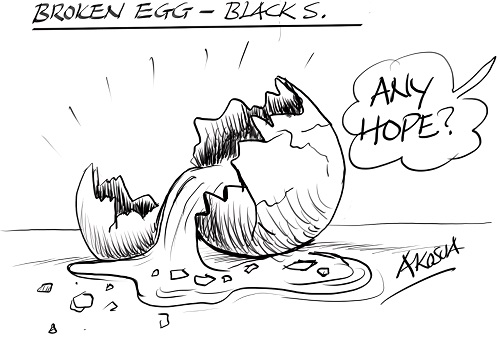
By Korsi DZOKOTO
The Electricity Company of Ghana (ECG), a vital state-owned enterprise responsible for the distribution of electricity across the country, is facing an unprecedented financial crisis. The company’s audited financial statements for the year ended 31st December 2022 reveal a disturbing trend of financial deterioration. This report delves into the financial performance, the worsening financial position, and the critical need for immediate intervention to prevent further decline.
A year of severe financial decline
The ECG’s financial performance in 2022 is a stark contrast to the previous year, marking a dramatic decline that threatens its very survival. The company recorded a colossal loss of GH¢10.2 billion in 2022, a figure that dwarfs the GH¢1.9 billion loss incurred in 2021. This 433.5% increase in losses is not merely a statistical anomaly but rather a clear indicator of deep-rooted mismanagement and operational inefficiencies.
At the heart of this financial disaster is the explosive growth in expenditure. Despite a notable 24.1% increase in total income, rising from GH¢12.1 billion in 2021 to GH¢15 billion in 2022, ECG’s expenses surged at an alarming rate.
The total expenditure for 2022 stood at GH¢25.2 billion, an 80.0% increase from the GH¢14 billion recorded in the previous year. This ballooning expenditure, which far outstripped revenue growth, is a primary driver of the company’s massive losses.
Several key factors contributed to this unsustainable rise in costs. Firstly, the direct cost of operations saw a significant increase of 40.8%, reflecting higher costs associated with power purchases and transmission.
These costs, which are central to ECG’s operations, should be carefully managed. However, under the current management, these costs have spiralled out of control, reflecting a lack of effective cost-control mechanisms and strategic planning.
Another major contributor to the financial decline was the staggering 963.3% increase in net exchange losses. This indicates a severe exposure to foreign exchange fluctuations, which has not been adequately managed by the company’s leadership. In a country where the local currency’s volatility can significantly impact financial outcomes, this lack of hedging or other risk mitigation strategies is particularly concerning.
The rise in administrative expenses, which grew by 36.3% in 2022, also points to inefficiencies in the company’s operations. Administrative costs typically cover salaries, office operations, and other non-operational expenses.
The significant increase in these costs without a corresponding improvement in the company’s operational efficiency or service delivery suggests poor management practices, possibly exacerbated by bloated staffing and other inefficiencies.
These alarming financial trends are a clear indication that the current leadership, predominantly made up of government appointees, has failed to manage the company’s resources effectively. The misalignment between income and expenditure reflects a broader issue of strategic mismanagement that needs to be urgently addressed if the company is to recover from its current predicament.
Deteriorating financial position
Beyond the alarming financial performance, ECG’s financial position as of 31st December 2022 further underscores the gravity of the situation. The company’s total assets grew by 39.6% to GH¢42.8 billion, up from GH¢30.7 billion in 2021.
On the surface, this might seem like a positive development. However, a closer examination reveals that this growth in assets is not a sign of improved financial health but rather a reflection of revaluations and additional procurement of property, plant, and equipment.
The increase in non-current assets, which rose by 45.6% to GH¢32.7 billion in 2022, was largely driven by these revaluations and new acquisitions. While investing in infrastructure and assets is essential for the long-term sustainability of any utility company, the timing and financing of these investments are crucial.
In ECG’s case, these investments appear to have been made without a corresponding increase in operational efficiency or revenue generation, leading to a situation where the company’s liabilities have outpaced its assets.
ECG’s current liabilities, which represent obligations the company must meet in the short term, increased dramatically by 66.3% to GH¢29.4 billion in 2022. This is a significant jump from the GH¢17.7 billion recorded in 2021 and highlights the company’s worsening liquidity position. With current liabilities far outstripping current assets, which stood at GH¢10.1 billion in 2022, the company’s current ratio—a key measure of its ability to meet short-term obligations—declined to a troubling 0.3:1 from 0.5:1 in 2021.
A current ratio below 1:1 is a red flag, indicating that ECG does not have enough current assets to cover its current liabilities. This liquidity crunch means that the company is likely to face significant challenges in meeting its short-term obligations, including payments to suppliers, staff salaries, and other operational expenses.
The deteriorating current ratio underscores the severe financial strain the company is under and raises questions about its ability to continue as a going concern without substantial financial restructuring or external support.
Adding to the financial woes is the increase in non-current liabilities, which rose by 16.4% to GH¢6.4 billion in 2022. Non-current liabilities include long-term debts and obligations that the company is expected to settle over a longer period. The increase in these liabilities suggests that ECG has been relying more on debt to finance its operations and capital expenditures, a strategy that may not be sustainable given the company’s current financial performance.
The combination of rising liabilities and inadequate asset growth has resulted in a decline in net assets, which fell by 6.4% to GH¢7.1 billion in 2022. This decline in net assets is a clear indication that the company’s financial health is deteriorating, further compounded by the fact that its liabilities are growing at a faster rate than its assets.
This negative trend in net assets is particularly concerning as it erodes the company’s equity base, making it more vulnerable to financial shocks and reducing its ability to attract investment or secure favourable financing terms.
Corruption, Overpriced contracts, and procurement breaches
The dismal financial performance and worsening financial position of the Electricity Company of Ghana (ECG) can be largely attributed to the pervasive corruption, mismanagement, and procurement breaches by government appointees who have been entrusted with the leadership of the company.
These appointees, often selected based on political considerations rather than merit or expertise, have not only failed to provide the strategic leadership needed to navigate the complex challenges facing the electricity distribution sector but have also engaged in practices that have exacerbated the company’s financial woes.
Under their watch, ECG has seen a dramatic rise in costs, particularly in areas where corruption and the awarding of overpriced contracts have been rampant. These contracts, often awarded without competitive bidding or adherence to proper procurement procedures, have led to inflated costs for services and goods. The lack of effective cost control and strategic oversight, coupled with these procurement breaches, has left the company in a precarious financial position.
The situation is further exacerbated by poor financial planning and risk management, which have allowed corruption to flourish unchecked. The lack of transparency and accountability in the management of ECG has created an environment where financial malpractices go unpunished, leading to significant losses and inefficiencies. There is little evidence to suggest that the current leadership is taking the necessary steps to address these issues, which continue to drain the company’s resources.
One of the key areas where the leadership has failed is in managing the company’s exposure to foreign exchange risks. The massive increase in net exchange losses is a direct result of poor risk management practices, compounded by corrupt practices such as the misappropriation of funds intended for currency hedging or other financial instruments designed to mitigate this risk.
In an environment where exchange rate volatility is a known risk, it is incumbent upon the company’s management to implement effective strategies. However, the failure to do so—often due to the diversion of funds or incompetence—has had a devastating impact on the company’s financial performance, contributing significantly to the overall losses recorded in 2022.
Additionally, the rise in administrative expenses can be attributed not just to inefficiencies but also to corrupt practices within the company’s operations. Government appointees, who often lack the technical expertise required to manage a complex utility company, have allowed the company’s administrative functions to become bloated with unnecessary positions and contracts awarded to cronies.
This is particularly concerning in a company like ECG, where operational efficiency is critical to maintaining service delivery and financial sustainability. The overpricing of contracts and unnecessary procurement further inflates costs, undermining the company’s ability to operate effectively.
The leadership’s focus on short-term political gains rather than long-term financial stability has also contributed to the company’s decline. Decisions that prioritize political expediency over sound financial management, such as the awarding of contracts to politically connected entities at inflated prices or the manipulation of procurement processes, have severely undermined ECG’s financial position. These practices not only erode the company’s profitability but also damage its reputation and ability to operate in a competitive market.
The need for urgent intervention
The current trajectory of ECG under government-appointed management is unsustainable and poses a significant threat to the company’s future. Without immediate intervention, the financial crisis at ECG could lead to a complete collapse of the company, with devastating consequences for Ghana’s electricity supply and broader economic stability.
To avert this crisis, there is an urgent need for comprehensive reforms at ECG. These reforms should begin with a thorough review of the company’s leadership and management practices. The appointment of competent professionals with the requisite technical expertise and experience in the electricity distribution sector is crucial to restoring confidence in the company’s management and reversing the current financial decline.
In addition to leadership changes, there is a need for a robust financial restructuring plan that addresses the company’s liquidity challenges and reduces its reliance on debt. This plan should include measures to improve operational efficiency, such as the implementation of cost-control mechanisms and the streamlining of administrative functions.
The company should also prioritize the development and implementation of effective risk management strategies, particularly in relation to foreign exchange exposure, to prevent further losses.
Furthermore, ECG must adopt a more transparent and accountable management approach. This includes regular financial reporting, the establishment of clear performance metrics, and the implementation of stringent oversight mechanisms to ensure that management decisions are aligned with the company’s long-term financial health.
Finally, the government must take steps to depoliticize the management of ECG. This can be achieved by ensuring that future appointments to the company’s leadership are based on merit and technical expertise rather than political considerations.
By prioritizing competence and accountability over political patronage, the government can help restore the financial stability of ECG and safeguard the future of Ghana’s electricity supply.
Conclusion
The financial crisis facing the Electricity Company of Ghana is a direct result of mismanagement by government appointees who have failed to provide the necessary strategic leadership.
The dramatic increase in losses, coupled with the company’s worsening financial position, highlights the urgent need for comprehensive reforms and a reassessment of the current leadership. Without immediate action, ECG risks further financial ruin, with far-reaching consequences for Ghana’s energy sector and overall economy. The time for decisive intervention is now, before the situation becomes irreparable.
The post ECG bleeds appeared first on The Business & Financial Times.
Read Full Story














Facebook
Twitter
Pinterest
Instagram
Google+
YouTube
LinkedIn
RSS